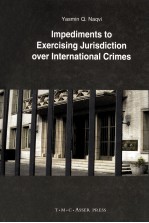图书介绍
IMPEDIMENTS TO EXERCISING JURISDICTION OVER INTERNATIONAL CRIMES【2025|PDF|Epub|mobi|kindle电子书版本百度云盘下载】

- YASMIN Q.NAQVI 著
- 出版社: T.M.C.ASSER PRESS
- ISBN:9067043206
- 出版时间:2010
- 标注页数:418页
- 文件大小:25MB
- 文件页数:434页
- 主题词:
PDF下载
下载说明
IMPEDIMENTS TO EXERCISING JURISDICTION OVER INTERNATIONAL CRIMESPDF格式电子书版下载
下载的文件为RAR压缩包。需要使用解压软件进行解压得到PDF格式图书。建议使用BT下载工具Free Download Manager进行下载,简称FDM(免费,没有广告,支持多平台)。本站资源全部打包为BT种子。所以需要使用专业的BT下载软件进行下载。如BitComet qBittorrent uTorrent等BT下载工具。迅雷目前由于本站不是热门资源。不推荐使用!后期资源热门了。安装了迅雷也可以迅雷进行下载!
(文件页数 要大于 标注页数,上中下等多册电子书除外)
注意:本站所有压缩包均有解压码: 点击下载压缩包解压工具
图书目录
Part One Exercising Jurisdiction over International Crimes3
Chapter 1 INTRODUCTION3
1.1 Impediments to exercising jurisdiction over international crimes9
1.2 Impediments11
1.3 Jurisdiction13
1.4 International crimes21
1.4.1 War crimes32
1.4.1.1 Grave breaches32
1.4.1.2 Serious violations of the laws and customs of war34
1.4.2 Crimes against humanity37
1.4.3 Genocide49
1.4.4 Torture59
Part Two Impediments75
Chapter 2 AMNESTIES75
2.1 Definition and historical context75
2.2 Amnesties and international and hybrid criminal courts and tribunals85
2.3 Contextual and policy considerations93
2.3.1 The need to secure the peace and maintain the peace95
2.3.2 The need for a public accounting of the truth98
2.3.3 The need to strengthen the rule of law and uphold the principle of legality102
2.3.4 The question of deterrence103
2.3.5 The need for reconciliation106
2.4 Legal rationales with regard to the exercise of jurisdiction in the face of amnesties110
2.4.1 The scope of the obligation to prosecute international crimes110
2.4.2 Whether victims’fundamental rights vitiate the validity of amnesty laws124
2.4.3 Whether States are constrained not to amnesty international crimes due to the peremptory character of international crimes138
2.5 Preliminary conclusions144
Chapter 3 PARDONS149
3.1 Definition and historical background150
3.2 Pardons and international and hybrid criminal courts and tribunals154
3.3 Contextual and policy considerations155
3.4 Legal rationales with regard to the use of pardons covering international crimes161
3.4.1 The scope of the obligation to punish those convicted of international crimes163
3.4.2 The possibility of pardons or commutation of sentence by international criminal courts171
3.4.3 Clemency by way of the guilty plea175
3.4.4 The possible ne bis in idem effect of pardon177
3.5 Preliminary conclusions181
Chapter 4 STATUTES OF LIMITATION183
4.1 Definition and historical background184
4.2 Statutes of limitation and international and hybrid criminal courts and tribunals188
4.3 Contextual and policy considerations190
4.4 Legal rationales with regard to statutes of limitation covering international crimes192
4.4.1 International customary law precludes the use of statutes of limitation over international crimes192
4.4.2 Obligations to prosecute international crimes or to ensure fundamental human rights are incompatible with statutes of limitation209
4.4.3 The purposes and principles underlying the use of statutes of limitation do not account for the specificities of cases dealing with international crimes211
4.4.4 Time may be tolled in many cases where international crimes have been committed214
4.5 Preliminary conclusions217
Chapter 5 IMMUNITIES221
5.1 Definition and historical background222
5.1.1 Functional immunity223
5.1.2 Act of State doctrine226
5.1.3 Personal immunity228
5.1.3.1 Diplomatic immunity229
5.1.3.2 Head of State Immunity230
5.1.3.3 Head of government and foreign minister immunity233
5.1.4 State immunity236
5.1.5 National immunity240
5.2 Immunities and international and hybrid criminal courts and tribunals243
5.3 Contextual and policy considerations246
5.3.1 Functional immunity246
5.3.2 Act of State doctrine248
5.3.3 Personal immunity249
5.3.3.1 Diplomatic immunity249
5.3.3.2 Head of State immunity249
5.3.3.3 Head of Government and Foreign Minister immunity250
5.3.4 State immunity251
5.3.5 National immunity253
5.4 Legal rationales with regard to functional and personal immunities for international crimes253
5.4.1 Treaty obligations to prosecute or extradite persons accused of international crimes are incompatible with immunities254
5.4.2 States have impliedly waived immunity of their officials by signing treaties criminalising certain international offences258
5.4.3 Customary international law lifts functional (and personal) immunityin case of international crimes262
5.4.4 The jus cogens nature of international crimes overrides immunity268
5.4.5 International crimes fall outside of the notion of ‘acts performed in a sovereign capacity’277
5.4. The fundamental rights of victims are incompatible with fundamental human rights281
5.5 Preliminary conclusions284
Chapter 6 THE PRINCIPLE OF NE BIS IN IDEM287
6.1 Definition and historical background288
6.1.1 Historical background288
6.1.2 Ne bis in idem and international and hybrid criminal courts and tribunals290
6.1.3 Definition292
6.1.3.1 What constitutes an ‘idem’295
6.1.3.2 Types of procedures to which ne bis in idem may attach300
6.2 Contextual and policy considerations306
6.3 Legal rationales with regard to the principle of ne bis in idem and international crimes310
6.3.1 Legal arguments countering a transnational ne bis in idem principle310
6.3.2 Fundamental defects in the trial/Sham trial315
6.3.3 Retrial in the case of newly discovered evidence or facts318
6.3.4 The State claim to exercise jurisdiction over offences committed on its territory322
6.3.5 Exception for certain offences323
6.3 Additional serious offences323
6.4 Preliminary conclusions325
Chapter 7 ABUSE OF PROCESS329
7.1 Definition and historical background330
7.2 Contextual and policy considerations332
7.2.1 The need to ensure a fair trial332
7.2.2 The need to preserve the integrity of the judicial system333
7.3 Legal rationales with regard to the doctrine of abuse of process and international crimes336
7.3.1 Abduction/Disguised extradition336
7.3.1.1 National level336
7.3.1.2 International level341
7.3.2 Procedural rights347
7.3.2.1 National level348
7.3.2.2 International level348
7.3.3 Delay352
7.3.3.1 National level352
7.3.3.2 International level353
7.3.4 Withholding of exculpatory evidence355
7.3.5 Double jeopardy357
7.3.6Breach of promises of non-prosecution (amnesty)357
7.3.6.1 National level357
7.3.6.2 International level358
7.3.7 Misuse of the criminal process361
7.4 Preliminary conclusions362
Part Three General Conclusion367
Chapter 8 GENERAL CONCLUSION367
Bibliography381
Table of Cases395
Index413
热门推荐
- 705485.html
- 2758414.html
- 1302899.html
- 161986.html
- 2226931.html
- 3137586.html
- 1391553.html
- 260908.html
- 1006215.html
- 3298447.html
- http://www.ickdjs.cc/book_1243668.html
- http://www.ickdjs.cc/book_2792971.html
- http://www.ickdjs.cc/book_3500721.html
- http://www.ickdjs.cc/book_1821081.html
- http://www.ickdjs.cc/book_1597638.html
- http://www.ickdjs.cc/book_3819564.html
- http://www.ickdjs.cc/book_853678.html
- http://www.ickdjs.cc/book_1185809.html
- http://www.ickdjs.cc/book_3382948.html
- http://www.ickdjs.cc/book_3233025.html